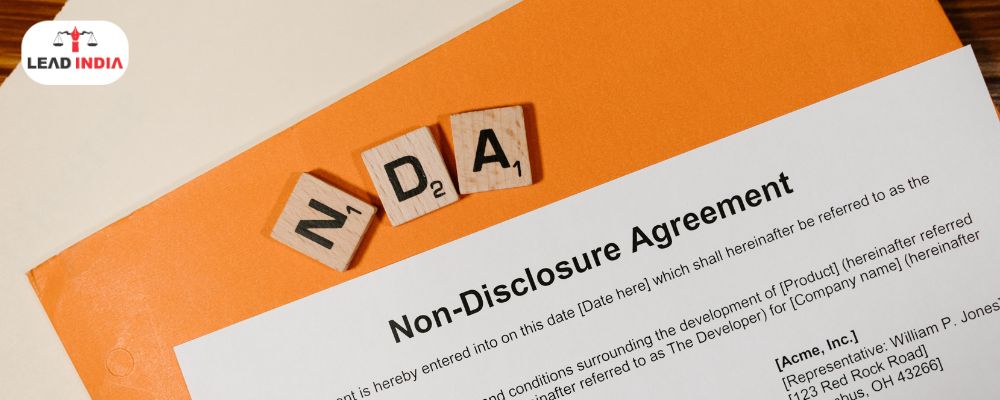In fast-paced and competitive environments, it is very important to keep safe all confidential information. One of the best forms of protecting sensitive information during business transactions including mergers and acquisitions is the non-disclosure agreement (NDA). These legal agreements create a framework of trust and confidentiality for both parties and prevent unauthorized disclosure or use of precious information. A lawyer versed with this subject matter could make sure that the concerned parties understand how non-disclosure agreements will influence their interests and secure that the lawful terms of an NDA provide necessary legal protection.
What are Non-Disclosure Agreements?
- An NDA, also termed a non-disclosure agreement, is a legal contract that establishes a confidential relationship between two or more parties engaged in any business deal or transaction.
- The core purpose of an NDA is to keep any sensitive information or trade secrets secret among parties during negotiations, partnerships, or discussions.
- An NDA establishes a safe framework within which confidential information may be exchange freely between parties while protecting other business interests involve. This agreement is critical to keeping a competitive edge since it prevents leakage of any proprietary information that could benefit the competitors.
Need A Legal Advice
The internet is not a lawyer and neither are you. Talk to a real lawyer about your legal issue

Importance of Non-Disclosure Agreements in Business Transactions
Protection of Intellectual Property:
As the brain behind the establishment of an NDA, the primary purpose was to safeguard one-of their legal rights and interests as far as intellectual property is concerned. The creation, techniques, articles, and logos of a business are termed IP. Just like their name suggests, NDAs help protect businesses, and their information from being disclose to the public by employees or partners, or from being use in a way that is not approve by the business.
Preventing Information Leaks:
In this era of digitization, the loss of data secrecy is fatal to any business. NDAs create a legal obligation for the recipient of such information to keep it away from others. This is most important for companies that are going to merge, acquire, or partner with another enterprise, as there is likely to be a lot of critical information like financial data under discussion.
Creating Business Alliances:
NDAs build up trust between business entities and their counterparts, customers, or employees. Information is less likely to be compromise because all parties involved are aware that any information that is expose would result in their association being terminate. Since people may cooperate to accomplish shared objectives, transparency results in more accurate commercial relationships.
Remedies Available in Case of Breach:
If one party violates a term of the NDA by releasing otherwise private information, the aggrieved party may pursue legal remedies. Some NDAs contain provisions for damages, injunctive relief, and other legal proceedings for breach of the NDA. The legal consequences of non-compliance require one to comply with the agreement.
How to Implement NDAs in Your Business Strategy?
- Identification of NDA Needs: Expectations would arise for NDA clauses during onboarding a new partner into the business, merger and acquisition scenarios, or when tipping off possible investors concerning their proprietary information.
- Define Confidential Information: Within an NDA, what is confidential should be define to outline the complete scope of protection.
- Choose the right type of NDA: Depending on the exchange nature, the choice will be unilateral or mutual NDAs.
- Use the Standard NDA Template: Creating a standard NDA for modification, it should consist of all fundamental aspects covering obligations, disclosure terms, and consequences of breach.
- Implement a Signing Procedure: Establish a procedure for signing NDAs prior to exchanging confidential information.
- Educate Your Team: Train employees with NDAs and their roles in protecting sensitive information.
- Monitor and Enforce Compliance: Checking compliance often and managing access to sensitive data while enforcing the NDA’s terms strictly.
- Review and Update NDAs Regularly: Safeguarding NDAs continues to be important with the changing texture of how businesses operate and the legal environment.
Limitations of NDAs
- Enforcement Challenges: It is always difficult to enforce an NDA especially where the information may have been previously disclose or the NDA scope is wide. Even where this act could be prove, the burden of proof for damage could be high making it difficult to seek injunctions.
- Public Interest: At times, certain pieces of information have a public interest in revealing, such as one’s illegal activities, public health and safety, and transparency within the government. NDAs would fail to bar other forms of disclosures where such fall outside public interest.
- Limited Protection: An NDA offers protection only to that information that is specifically name and define in the agreement. Any such disclosure of information that is not cover in that NDA or any other way that is not prohibit in the agreement will not afford protection.
For a strong business strategy to occur, non-disclosure agreements are exceptionally important. An understanding of the needs of every NDA, the definition of the information to be classified as confidential, usage of the right NDA, and then standard procedures and regular updates will help ensure compliance and will aid businesses in protecting their sensitive information.
One can talk to a lawyer from Lead India for any kind of legal support. In India, free legal advice online can be obtain at Lead India. Along with receiving free legal advice online, one can also ask questions to the experts online for free through Lead India.





 Talk to a Lawyer
Talk to a Lawyer